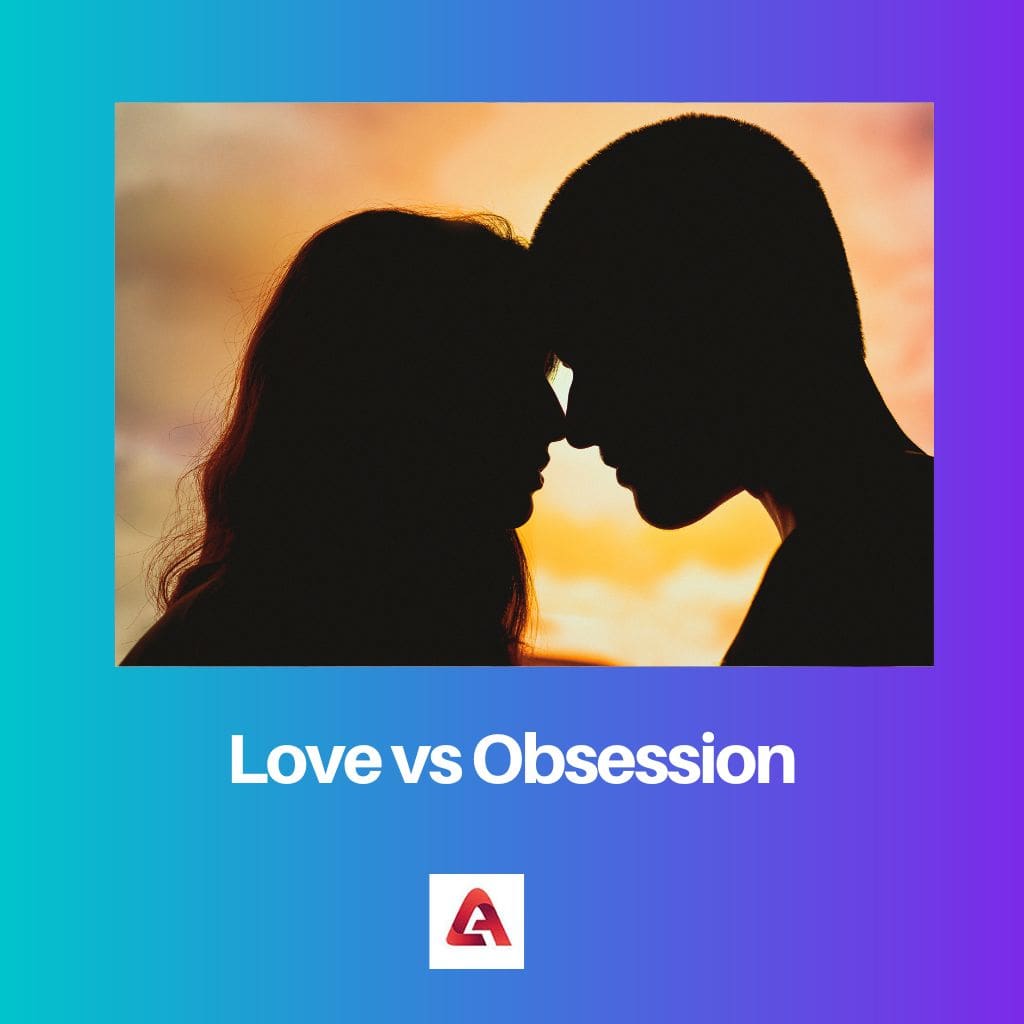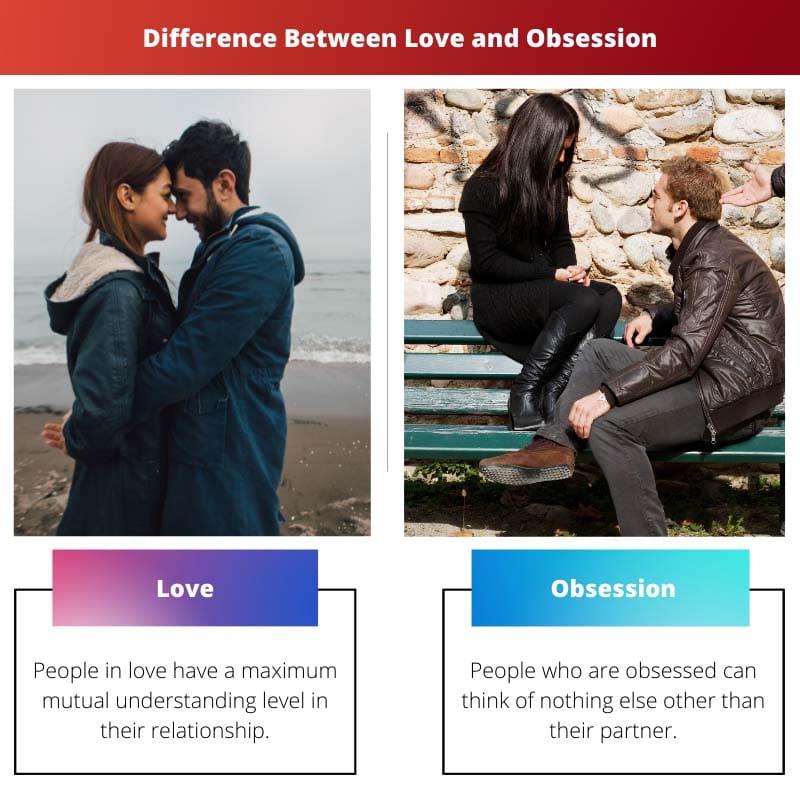Love is a gentle breeze that uplifts and respects, fostering growth and understanding. Obsession is a suffocating storm, demanding control and possession, drowning both parties in its turbulent currents.
Key Takeaways
- Love involves a healthy balance of give and take, while obsession involves one person’s overwhelming need for control over another.
- Love grows and changes over time, while obsession remains fixed and unchanging.
- Love is based on mutual respect, trust, and communication, while obsession is based on jealousy, possessiveness, and manipulation.
Love vs. Obsession
Love is a deep and affectionate feeling towards someone or something. Feelings of warmth, tenderness, and compassion characterize it. Love involves mutual respect, trust, and a willingness to compromise. Obsession is an unhealthy and overwhelming preoccupation with someone or something. It is characterized by feelings of possessiveness, control, and a lack of boundaries.

Love is universal, whether in humans or animals, mother’s love, or in young couples, irrespective of gender. Love always means caring, supporting, and giving.
The partner in love wants the best for the other and always wants them to be happy even if they are not a part of their life; it involves sacrifices for the one he loves.
It can be said that love has no limits and complete freedom, and one gives more importance to others’ needs in love.
Obsession is Universal and can be seen in any relationship, whether humans or animals. Obsession includes pleasing their partner by hook or crook and trying to control or limit giving time or attention to others.
It leads to physical abuse, anger, and jealousy, and the partner always chooses himself or his ego in a debate. Often the relationship goes out of control, making it even harder to quit without feeling guilty.
Comparison Table
| Feature | Love | Obsession |
|---|---|---|
| Focus | Wellbeing and happiness of the other person | Self-gratification and fulfilling personal needs |
| Emotions | Joy, contentment, trust, security, compassion | Intense possessiveness, jealousy, anxiety, fear of abandonment, anger |
| Respect | Respect for personal boundaries and individuality | Disregard for boundaries and attempts to control the other person |
| Growth | Encourages personal and emotional growth in both partners | Stifles individual growth and prioritizes the obsessed person’s needs |
| Health and well-being | Promotes emotional and mental well-being for both individuals | Can be emotionally and mentally draining for both individuals, especially the object of obsession |
| Expectations | Mutual respect, trust, and support | Unrealistic and one-sided demands and expectations |
| Relationship dynamics | Balanced and equitable, with both partners contributing | Unequal and controlling, with the obsessed person dominating the relationship |
| Long-term sustainability | Has the potential to grow stronger and last over time | Unhealthy and unsustainable, leading to conflict and breakdown of the relationship |
What is Love?
Love is a complex and multifaceted emotion that transcends mere words, encompassing a profound spectrum of feelings, actions, and experiences.
The Essence of Love
At its core, love is an unconditional acceptance and appreciation of another person, embracing their flaws and virtues alike. It’s a deep sense of connection and empathy, where one’s happiness becomes intertwined with the happiness of another.
Forms of Love
Love manifests in various forms, including romantic love, familial love, platonic love, and self-love. Each form carries its own unique dynamics and expressions, yet all share a common foundation of care, respect, and commitment.
Components of Love
Love comprises elements such as trust, communication, empathy, and intimacy. It involves mutual understanding and support, as well as the willingness to compromise and grow together.
The Power of Love
Love has the power to heal wounds, inspire greatness, and bring profound joy and fulfillment. It fosters a sense of belonging and security, providing a sanctuary in a world fraught with uncertainty.
Love’s Evolution
Love evolves over time, deepening and maturing as relationships weather challenges and experiences. It requires nurturing and effort to sustain, yet its rewards are immeasurable, enriching the lives of those who embrace its transformative embrace.

What is Obsession?
Obsession is an intense fixation or preoccupation with a person, object, or idea, characterized by overwhelming and irrational thoughts, feelings, and behaviors.
Characteristics of Obsession
Obsession entails an uncontrollable urge to possess or control the object of desire, leading to a distorted perception of reality. It can manifest as compulsive behaviors, intrusive thoughts, and a relentless pursuit that disregards boundaries and consequences.
The Nature of Obsessive Relationships
In relationships, obsession may manifest as an unhealthy attachment, where one individual becomes consumed by the other, neglecting their own well-being and autonomy. This can result in possessiveness, jealousy, and manipulation, creating a toxic dynamic that undermines trust and mutual respect.
Effects of Obsession
Obsession can have detrimental effects on both the individual experiencing it and those around them. It leads to emotional distress, anxiety, and a loss of perspective, as well as strained relationships and social isolation. Additionally, obsession may impede personal growth and fulfillment, as the individual fixates solely on their object of desire.
Distinguishing Obsession from Love
While love involves mutual respect, trust, and growth, obsession is characterized by possessiveness, control, and an inability to let go. Love nurtures and empowers; obsession suffocates and consumes. Understanding the distinction is crucial in fostering healthy relationships and preserving one’s well-being.

Main Differences Between Love and Obsession
- Reciprocity:
- Love is characterized by mutual respect, trust, and consideration for the other person’s needs and desires.
- Obsession lacks reciprocity, with one person fixating on the object of their obsession without regard for the other’s well-being or autonomy.
- Freedom vs. Control:
- Love allows individuals to maintain their independence and freedom, fostering growth and personal development within the relationship.
- Obsession seeks to exert control over the object of desire, resulting in possessive behaviors and attempts to manipulate or dominate the other person.
- Healthy Boundaries:
- Love respects boundaries and encourages open communication and compromise.
- Obsession disregards boundaries, leading to intrusive or controlling behaviors that infringe upon the other person’s autonomy and emotional space.
- Emotional Stability:
- Love promotes emotional stability and security, providing a supportive foundation for both individuals to navigate life’s challenges.
- Obsession can lead to emotional instability, anxiety, and fixation, as the individual’s happiness becomes overly dependent on the object of their obsession.
- Longevity and Growth:
- Love fosters long-term commitment and growth, with both individuals evolving and adapting together over time.
- Obsession tends to be short-lived and stagnant, focused solely on the immediate gratification of desires without consideration for the future or the well-being of the individuals involved.




